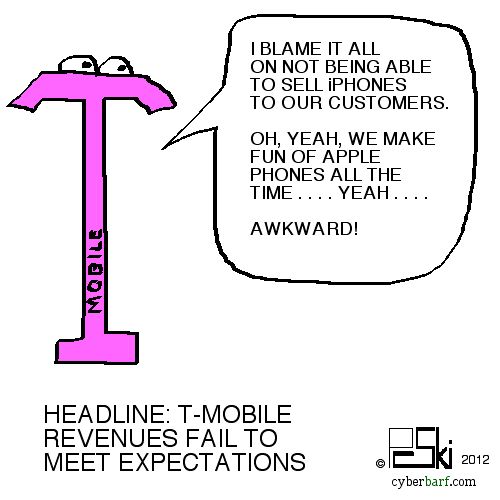|
CYBERBARF.COM
|
|
EXAMINE THE NET WAY OF LIFE MARCH, 2012
IN THIS ISSUE: iEDUCATION FOLDING ON-LINE GAMBLING PUSH COMES TO SHOVE iToons WHETHER REPORT THANK YOUR FOR YOUR CONTINUED SUPPORT. CYBERBARF |
e
|
|
cyberbarf EXAMINE THE NET WAY OF LIFE |
|
cyberbarf iEDUCATION COMMENTARY As our late Tech Guru Rocky was fond of saying, “technology is only a tool and not a substitute for teaching.” However, bankrupt school districts and parents upset with diminished student academic scores are grasping for a cure-all remedy to fix the public schools: tablet computers. The theory is apparently that giving students tablets will make learning fun again. That assumption is debatable. Learning is the acquisition and subsequent application of knowledge (known facts). Students learn by reading, writing, memorizing, problem solving and testing. Substituting a tablet computer for physical textbooks does not guarantee that students will read more, write more, problem solve or test better. It takes a student who wants to learn and involved parents who can instill the value of an education to their children that is key. When Apple announced its new education initiative, it meant that traditional textbook publishers would go digital at a $15 per book cap distributed through Apple. Apple would sell the iPad reader devices to the schools. Win-win for Apple and the publishers. Or so it seems. For a school with 2,000 students, we estimate that the cost to equip just this one facility with readers and five course books is at least $1 million. If a school district has ten schools, that is $10 million. But how would the cost be passed on? Increased taxes for already strapped taxpayers? Force parents living paycheck to paycheck to spend almost a thousand dollars on an iPad and textbooks for an elementary student? And what happens to the iPads? Are they secured inside the school at all times, or since they are substitute textbooks, taken home each night for homework assignments? And what happens when the iPads get lost or stolen? And how much abuse can a tablet take on a bus, on a playground, and in a classroom? Being able to instantly update textbooks via a digital media sounds like a solution to improve education. But what are the core problems with the American education system? Experts believe the root causes of the degrading public school system are: 1) bad teachers. Tenure and unionization has made it impossible to fire bad teachers. There lacks accountability because of this job security. Some bad teachers are just unqualified to teach the subjects given to them. Some bad teachers are disinterested in the entire system and use it as day care until retirement. Some cut back their own work load by lessen the amount or difficulty of assigned subject matter or homework projects. 2) unsafe schools. The learning environment is as critical as teaching methods. An environment that is not conductive to learning will dampen learning. Inner city schools rife with gang activity, drugs and lack of discipline turn schools into juvenile prisons. Students who fear for their own safety lack the concentration to study. 3) tangent activities. Even suburban school children are distracted by outside activities emphasized by the peers or their parents, especially extracurricular sporting activities (school sponsored or club teams). In some competitive sports, long hours of training and practice take away valuable nightly study hours for student athletes. There is a direct correlation between the amount of time studying subject matter and test scores. 4) lax parenting. Many families have both parents working outside the home. Therefore, many students are left to their own devices to plan their after school activities. Homework and test prep is not on the top of very many teen lists. Cellphones, text messenging, on-line game battles, television, movies or just hanging out take priority than putting in an extra effort in mastering their subjects. Learning specialists believe that parents who actively participate in their child's homework will train students in better study habits and an appreciation for learning. 5) bureaucracy. Many schools are dependent upon state and federal educational funds to focus resources on student learning materials. For each grant, bureaucratic paperwork must be compiled and completed. That takes away manpower and resources. In addition, some mandates require certain curriculum to be taught to meet standardized testing. Standardized testing may lead to lowering the learning curve for the entire student body, as the reward is greater to marginally increase the lowest common denominator than trying to excel gifted students. The American education system is at a crossroads. It's original purpose was to teach basic skill sets for the general public to find gainful employment in the post-agricultural USA. The means to finding a well paid job was to get a high school diploma and for a professional occupation, a college degree. But today, getting any sort of degree is not a guarantee of employment. Fifty percent of high schoolers do not graduate. Fifty percent of college students do not get their four year degrees. The growth of a less educated working class is upon us. So the purchase and use of tablet computers and digital textbooks does not address any of the five problem areas in public education. In certain other cultures (in Asia and India), students spend twice the amount of time reading, writing, and doing homework problems than American students. In China, where the one child rule controls, parents spend up to ten percent of their income on supplemental educational services (tutors, books, advanced placement exams) for their child. Those parents are acutely aware that without a superior education, their child will have no opportunity or success in the future. In some respects, Americans do not value education as much as persons living in the early stages of the Industrial Revolution of the late 1800s. At that time, education was elitist and expensive. Today, university education programs are extremely expensive which is making it impossible for some middle class parents to send their children for a four year BA or BS degree. Students that can muster $120,000 in student loans now receive a diploma and no prospect of employment. The system is broken, but the offered solutions of spending more money on technology and tools, does not correct the root problems.
cyberbarf MURMUR:LOST SOULS REAL NEWS KOMIX We continue our new graphic novella with Part Three.
cyberbarf FOLDING ON-LINE GAMBLING ESSAY The federal government has been cracking down on on-line gambling for the past year. Many popular poker sites have been seized and shut down. The reason is simple: it is illegal to gamble across state lines. In order to combat organized crime, federal wire fraud laws were enacted that prohibited the interstate transmission of gambling information and wagers. The feds beefed up their arsenal of laws by enacting a prohibition against credit card processing companies from transacting money transfers from bettors and off shore gambling servers. It is a kin to money laundering, so bank wire transfers were also squeezed. Last year, the US indicted and seized several overseas internet gambling sites, including PokerStars, Full Tilt Poker and Absolute Poker for criminal fraud and money laundering by creating alleged fake online merchants to run payments through the US banking system to cover illegal Internet gambling transactions with customers. In 2006, the US enacted a law which banned normal payment processing transactions of gambling operations. The idea was to cut off the money transfers for illegal on-line gambling operations. Just as the feds are clamping down on private off shore gambling sites, a new and bigger player wants in on the game. The stakes are enormous and the profits theoretically great. States now want to move their lottery operations on-line to increase player participation. Nevada legalized Internet gambling for IN-STATE residents only. However, since the web connects to the entire world, their are probably hacks to get around ISP address blocks for people in New York or London to roll virtual dice on a Henderson Nevada server. With legalized gambling now within one hour from every man and woman in the United States, the rush into Internet gambling by the States is a troublesome trend. Recall, many States used the specter of funding education as the reason for allowing state lotteries. But those States have used the money for general purposes and their state funding for education has actually decreased over time. In a weak economy, and the expansion of casino gambling, State lotteries have felt decreased revenue. Some banded together to form MegaMillions and PowerBall plays to increase the prize pools to generate more interest. But that has merely slowed the downward revenue trend. Now States like Illinois, have privatized their lotteries in order to increase profits. However, these private firms want to use state sovereignty to get into a form of gambling prohibited by federal law: INTERSTATE GAMBLING. The federal government will not allow interstate gambling, even if the States are the operator of the games. The temptation for abuse and corruption is too great. Further, there is no compelling need to have the United States of Internet Gaming. If someone wants to gamble, they have plenty of gambling venues within driving distance of their home. Critics of gambling say that the increased spectrum of gambling is feeding a national epidemic: addictive gamblers are ruining their savings and personal relationships as a result. They believe the social cost in distracted workers, theft, gambling debts and breakdown of the home life is greater than marginal revenue growth a State would incur by expansion of gambling. cyberbarf PUSH COMES TO SHOVE ESSAY It is human nature to push back when some one attempts to force you to do something that you are unsure of . . . or have personal objections. This stress point is coming quickly to computer software. Hardware manufacturers are enamored with the mobile operating system. They believe it is the future. And that the future is now, in gesture based commands. But if you are in business, working on lengthy manuscripts, reports, working on full screen spreadsheets that need full keyboard access, the only gesture you may give is a middle finger to anyone who is trying to complicate your life. Gesture command based operating environments may work by necessity on four inch touch screens of a smart phone. But gesture infused pinch and scroll bars on a laptop or desktop environment are more maddening than useful. Beyond the operating system dynamics, manufacturers and software developers are pushing non-physical media for current software distribution. No longer will one be able to purchase a physical copy of a software program or update. You will have to download it from the developer's site or application store. But there are numerous times where one's system has crashed and you need to re-install, clean install or find a utility program on the original program discs. But no more. You are at the mercy of the suggestion that developer's programs and operating systems will not crash like they used to . . . or if they do, and assuming you can restart your machine . . . go to the web for a web based solution. Again, you may not have web, wi-fi, bluetooth or ethernet access on the road or at home during a blackout crash. The presumption is that since mobile users have adopted the over-the-web approach to uploading and downloading files, everyone should adopt it. Hogwash, cry the critics. It is a matter of personal privilege, the critics say. When you buy a piece of software, you should have a physical archive of it in case something goes wrong. Developers may be attempting on the sly to get around the physical "first sale doctrine" to corral all software users into a cloud based pay-access license for future operating systems and programs. Forcing users into the cloud (a third party off-site storage facility) for both operating software and access to applications to use raises serious issues of real access and personal privacy and security of personal information. For example, if you needed to write a letter in Word. You open you Word program on your laptop and begin typing. Under this new cloud push digital delivery system, you would have to log onto the web, access a Microsoft account (for a fee no doubt) and open the application off-site on Microsoft shared servers, create your document on someone else's hard drive, then send the document back to you via some web print program/protocol. Your word file would remain on the third party server and not on your own personal computer. For many professions and businesses where health, personal and financial information must remain strictly confidential, this system of web application access and document creation is not feasible. Developers and hardware manufacturers are engineering more lack of backward compatibility in their products. It is a means of forcing people to continually buy upgraded machines that can run the newest OS because the newest programs run only on the newest OS. This is a way to bitch slap revenue from people who are still using ten year old word processing programs because those programs still work on their home or business computers. But if you take away that option of having an individual owning a copy of the application on his own computer, that person would be subject to additional license fees, monthly charges, account maintenance fees - - - a host of new charges because access is now solely web based. And that will lead to cries of price gouging and a resistance movement. Just as any pendulum swings hard in one direction, it will eventually swing back in the opposite direction (in this case back to new sources of physical media applications). The whole idea that this push away from personal laptop and desktop computing is being forced upon the masses, whether they like it or not, is unseemly totalitarianism. The Internet is viewed by most as a utility, a tool that can be used at the will of the user, like the telephone or an electric light switch. But this new concept reverses the roles somewhat; it creates the Internet as the (developer) master and user as the servitude serf. |
|
THE PINDERMEDIA STORE IS FULL OF FUN TEE-SHIRTS AND SELECTIONS. FUN . . . . VALUE . . .. FUN . . . . VALUE! GO FOR IT!
SUPPORT cyberbarf VISIT THE CYBERBARF STORE! Prices may vary depending on sales, allotments, inventory. |
|
iToons
|
|
cyberbarf THE WHETHER REPORT |
cyberbarf STATUS |
| Question: Whether Apple will win its China iPad trademark dispute? |
* Educated Guess * Possible * Probable * Beyond a Reasonable Doubt * Doubtful * Vapor Dream |
| Question: Whether schools will adopt student laptops over student tablets in the classroom? |
* Educated Guess * Possible * Probable * Beyond a Reasonable Doubt * Doubtful * Vapor Dream |
| Question: Whether the push of everything through the net, from applications, storage, downloads to music and streaming video, going to choke the current infrastructure? |
* Educated Guess * Possible * Probable * Beyond a Reasonable Doubt * Doubtful * Vapor Dream |
|
cyberbarf EXAMINE THE NET WAY OF LIFE |
Sports do not build character. They reveal it. Heyword Hale Broun |
|
cyberbarf
THE STEAM PUNK SPECIAL EDITION featured new Music from Chicago Ski & the (audio) Real News: (mp3/4:14 length)
EXAMINING THE NET WAY OF LIFE cyberbarf™ distributed by pindermedia.com, inc. |
|
FEATURING: THE REAL NEWS IMPACT EDITORIAL CARTOONS WRIGLEYVILLE WAR POLITICS ENDORPHIN RUSH THE DARK ABYSS RANDOM ELECTRONS SPECIALS
FEATURING: THE REAL NEWS ARCHIVES CARTOONS MADAME'S TEA HOUSE THE BAR EXPLORE THE CITY SCAPE UNDER CONSTRUCTION SURPRISES ESTORE SPECIALS
|
REWIND
LOST
AFTER
A
FULL YEAR
ON
LOSTHEORY
cyberbarf
Distribution ©2001-2012 pindermedia.com, inc.
All Ski graphics, designs, cartoons and images copyrighted.
All Rights Reserved Worldwide.



 he
far reaching powers of the bills. Protesters feared the sinister nature
of the government controlling the last bastion of freedom: the world
wide net.”
he
far reaching powers of the bills. Protesters feared the sinister nature
of the government controlling the last bastion of freedom: the world
wide net.” 




















